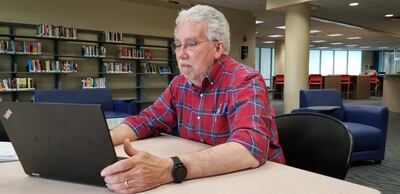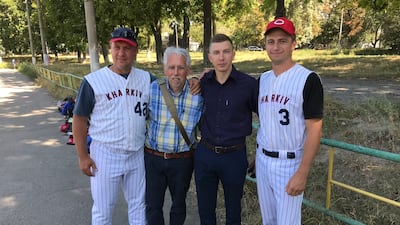Somewhere amid Kharkiv’s smouldering city streets in north-eastern Ukraine, paintings and artwork by a group of American elementary pupils may well be blowing in the wind.
The art display was part of an exchange project between pupils from Cincinnati, Ohio, and some in Kharkiv, organised through Sister Cities International, a citizen diplomacy network.
But now the exhibition is thought to have been destroyed.
“We sent [the children's] artwork over in January,” says Bob Herring, president of the Cincinnati-Kharkiv Sister City Partnership.
“The museum [hosting the display], I’ve seen pictures of it. Its windows are blown out. I don’t think the American kids are ever going to get their artwork back.”
While the wider world looks on aghast, communities around the globe that have fostered ties with Ukrainians over the years are left wondering what comes next.
Since the fall of the Berlin Wall in 1989 and subsequent collapse of communism, Kharkiv and Cincinnati have held sister-city status, tied by a shared industrial history and their locations on inland rivers.
Over the decades, activists in both cities have worked to build relationships that have brought major change on local issues such as election best practices, infrastructure development and wider cultural exchange.
Mr Herring, a former school principal, says he became involved in 2013, shortly before Russian-backed separatists took up arms in eastern Ukraine and Moscow occupied Crimea.
“At that time Kharkiv was dealing with a lot of internally displaced people who had fled the war in the Donbas,” he says.
“Kharkiv sent a delegation here to take a look at best practices in terms of policies and procedures dealing with homeless people. How do you feed and house people; that whole service network.”
For Mr Herring, who has visited Kharkiv several times, seeing his colleagues on the other side of the world deal with the losses of the Russian invasion has been tough.
He says one in Kharkiv was supposed to visit Cincinnati last month to see how small Ohio communities join together to pool resources such as emergency services. But the trip was cancelled.
“Its all bad news. He left the east [of Ukraine] and headed west,” Mr Herring says.
Across the US, dozens of cities including Chicago, which is tied with Kyiv, and Milwaukee, which is paired with the Kyiv satellite town Irpin, have launched major aid operations to help Ukrainians fleeing the war.

But while several US cities are digging in to help their contacts in Ukraine, others are moving to suspend ties with Russian cities.
Chicago and Dallas have severed ties with sister cities Moscow and Saratov.
Smaller cities are also ending relationships. Colorado Springs had sister city status with Smolensk in western Russia, but in early March indefinitely suspended that relationship.
“No one from the City will participate in any visits to Smolensk, nor will we host any one from Smolensk for the foreseeable future,” a city official says.
While many moves are symbolic at most, some have real consequences for American and Russian residents.
The mayor of Dallas, Eric Miller, announced that the city would be “agreeing to not approve city contracts with entities that have significant Russian ties.”
But not everyone believes ending a sister city arrangement is a productive move.
When a council member for the city of San Jose in California proposed cutting ties with its Russian sister city, Yekaterinburg, at a meeting last month, his motion was defeated.
“The relationships that we establish take years to deepen,” says Tim Quigley, chair emeritus of Sister Cities International and president of the San Jose-Yekaterinburg Sister City programme.
"So through the rough moments when governments are at sore points there is this sustaining connect of trust between the people we work with."
Mr Quigley says his peers in Russia have written to him requesting that the relationship not be suspended.
“This linkage is absolutely essential. In many cases it’s the last line of connect with the outside world. We do not demonise the folks at the other end.”
It is a sentiment shared by Mr Herring.
“If there’s a relationship, a friendship, a history, I would want to preserve that,” he says. “It may be strained, it may be uncomfortable, it may be difficult, but I would rather preserve that.”
Mr Herring says his contacts in Kharkiv, now scattered across the country, say that rather than medicine and first aid, cash donations are a top priority.
He and others are hoping to reach a Cincinnati donation goal of $100,000 by mid-April.
Longer term, Mr Herring is concerned about what would happen should Russia occupy Kharkiv, which is less than 30 kilometres from the Russian border.
“If there’s a puppet government there, would it be interested or be allowed to work with us, to set up an NGO?” he asks.
“All of our people are gone. I don’t know if they’re going to go back.”

